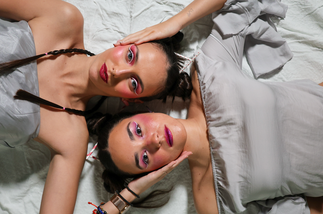Unmute
- julianeevatne
- 26. mars
- 2 min lesing
In 2025, what does 'being a good human' really mean? Is it about having the guts to change something, or is it about looking good online?
We share Tiktoks about trans and gay rights while watching them get taken away everywhere.
We post about abortion rights while they are being rolled back –not just in the U.S., but across the globe.
We talk about equality while scrolling through apps that sell us stuff made by workers getting paid next to nothing in sweatshops.
We scream about exploitation while wearing clothes made by those same workers.
We turn up the volume on the voices of the oppressed while we drown them out with our own noise, our own comfort.
The irony is that we are sharing these posts on platforms owned by billionaires who are literally planning their escape to Mars. Meanwhile, our planet’s burning, politics are falling apart, and we just keep scrolling. It’s absurd.
Think about this: Not that long ago, the biggest country in the world froze foreign aid while people starve, families are fleeing war, and refugees are being abandoned at the borders – no safety, no hope.
The rise of global conservatism? It’s not just in the U.S, it is not just online. It’s spreading everywhere, from Eastern Europe to Latin America to Asia. We’re seeing it in authoritarian regimes popping up, nationalist movements gaining ground, and even this ‘trad wife trend” nonsense where women are basically told to shut up and stay in their place.
We’re the generation with all the information at our fingertips.
But we’re also the generation most likely to just post about it.
We’re ‘woke,’ but we’ve been taught to care in ways that don’t actually change anything. We don’t march anymore. We share.
We don’t organize. We ‘engage.’
We don’t risk anything. We just ‘raise awareness.
Some people would call us the new ‘Silent Generation.’ Not because we don’t talk – but because we’ve forgotten how to make our voices matter. We create stories about changing the world, but do we dear to really change it?
The film industry is no exception to this. We create stories that demand change, yet how often do we actually risk something for that change?
We make films that expose injustice, but do we ever challenge the systems that allow injustice to thrive, both on screen and off?
We are storytellers. But what kind of stories are we telling? Stories that preach to the already-convinced masses? Or stories that challenge the very foundation of the world we live in?
Stories that force us to ask ourselves: What are we actually willing to risk? Are we ready to make the stories we tell count?
Look at the world around us: books are being banned, voices silenced, and freedom of speech threatened. The real question is not whether we are allowed to share our opinions, it is whether those opinions still matter, and whether we are willing to fight for the freedom to voice them.
If we don’t act now, we risk becoming the generation that watched the world unravel and did nothing.
We are the new storytellers, with the power to challenge, to disrupt, to ignite change. But that power only matters if we dare to use it, before it’s too late.
We’ve all been handed the privilege of creating. But have we forgotten that with that privilege comes responsibility?
If we truly believe in the power of storytelling, then it’s time to ask ourselves: When did we settle for good intentions, instead of demanding real impact?
That's the question we must find an answer to, not just for our films, but for the future we’re creating with our voices, our work, our stories, and our actions.









Comments